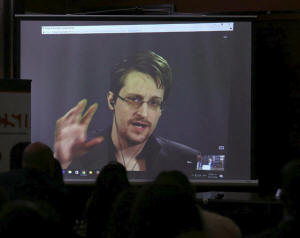|
Snowden warns of increase in U.S.
domestic spying after Trump victory
 Send a link to a friend
Send a link to a friend
 [November 15, 2016]
By Hugh Bronstein [November 15, 2016]
By Hugh Bronstein
BUENOS AIRES (Reuters) - Donald Trump's
election as U.S. president raises concern that Washington may increase
the intrusiveness of domestic intelligence gathering, former U.S. spy
agency contractor Edward Snowden said on Monday, warning that democratic
checks and balances were losing ground to authoritarianism.
Snowden lives in Moscow under an asylum deal after he leaked classified
information in 2013 that triggered an international furor over the reach
of U.S. spy operations. He spoke at a teleconference hosted by Buenos
Aires University's law school.
"We are starting to substitute open government for sheer
authoritarianism, a government based not upon the principle of informed
consent granted by people who understand its activities but rather a
trust in personalities, a trust in claims, a trust in the hope that they
will do the right thing," Snowden said.
Washington pledged not to engage in indiscriminate espionage following
Snowden's 2013 disclosures. But Snowden questioned if that policy could
be modified by new officials "who have a very different set of values
and can govern in the dark."

"If government does actually win our trust, because they go for some
years and they do operate in a way that we should support, what happens
when it changes?" he asked.
"This is kind of the challenge that we're facing today in the United
States with the result of the last election."
Supporters see Snowden as a whistleblower who boldly exposed government
excess. But the U.S. government has filed espionage charges against him
for leaking intelligence information.
Trump, who scored an upset win over Democrat Hillary Clinton in last
Tuesday's election, broke with many in his own Republican Party during
the campaign and emphasized his success as a businessman and reality TV
show star. He promised sweeping security measures to deal with the
threat of attacks on the United States.
[to top of second column] |

Edward Snowden speaks via video link during a conference at
University of Buenos Aires Law School, Argentina, November 14, 2016.
REUTERS/Marcos Brindicci

His election was greeted with concern from the American Civil
Liberties Union over statements he made during the campaign
supporting increased surveillance of U.S. Muslims, mass deportation
of illegal immigrants, reauthorization of waterboarding and changing
libel laws to increase press restrictions.
Snowden, asked if he thought the election of Trump, who has praised
Russian President Vladimir Putin as a strong leader, might increase
chances of him being pardoned by the U.S. government, responded:
"Who knows?"
(Reporting by Hugh Bronstein; Editing by Peter Cooney)
[© 2016 Thomson Reuters. All rights
reserved.]
Copyright 2016 Reuters. All rights reserved. This material may not be published,
broadcast, rewritten or redistributed.

 |